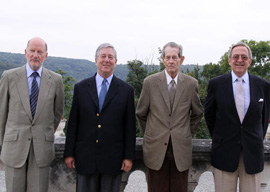
June 16, 2012

Simeon of Bulgaria, Alexander of Serbia, Michael of Romania, Constantine of Greece
A specter is haunting Europe”and pace Marx, it is the specter of monarchy. Whenever a ceremony of any sort is performed for or by a deposed ruling family’s members”as has happened in the past few years in France, Germany, and Austria“there is sure to be whining in the media and among the political caste.
This is understandable, since the latter are the heirs of those who seized power and aim to keep it forever”regardless of what their subjects might want. Sundry triumphant pols passed laws forbidding the physical return of royal heirs to their nations”even as visitors. One by one, however, these measures were voided until the European Court tossed out the last of them and allowed the House of Savoy to return to Italy.
The entrenched political class feared that once back, the royals might regain some of their property. To avoid this, recourse was had in several countries (most notably Austria) to the kind of legal chicanery we Americans are used to with the Supreme Court. But the dominant classes” apprehensions were fulfilled in all the Balkan countries”heretofore exposed to the reductio ad absurdum of “democracy” in the form of exquisitely brutal communist regimes.
With the exception of Greece, which with Anglo-American help had avoided its sister countries” red servitude, the populations of the formerly Marxist region welcomed back their former monarchs (or their heirs) with open arms”going so far as to reverse the theft of much of their former property. The Balkan royals began once again to play supporting roles in their homelands” public life. Simeon II of Bulgaria was perhaps the most successful. Acting as the focus of a grassroots political movement, he was elected prime minister in 2001.
But after leaving office in 2005 with a solid record, the King assumed the same sort of quasi-royal role his brother monarchs of Serbia, Romania, Montenegro, and Albania had. He met secular and religious dignitaries, gave out decorations, and advertised his country abroad. He did everything a reigning constitutional monarch would do, save opening and closing parliament and receiving ambassadors. This satisfying if anomalous position, financed by his regained lands rather than tax dollars, annoyed the class in power. To choke off his activity, they used that weapon so beloved of “democratic” oligarchs everywhere and took him to court to steal his lands once more. They just won a major victory: The country’s Supreme Court has ruled that Simeon’s hunting lodge at Krichim does not belong to him, opening the legal path to pilfering the remainder of his estates.
So steeped have we become in the politics of envy that the government robbing a rich man”better still, an ex-reigning sovereign”will bring joy to many. This is why the decades-old reduction of Britain’s landed aristocracy from a political force to a band of desperate folk trying (and often failing) to hold onto what is left of their inheritance begets either a smile or a yawn. If Simeon is to continue to play a useful role in his country’s life, he will need to seek justice”paradoxically enough”from the European Court of Human Rights. It is ironic that this is happening under Boyko Borisov‘s scandal-ridden prime ministry. The contrast between monarch and politico could not be starker.